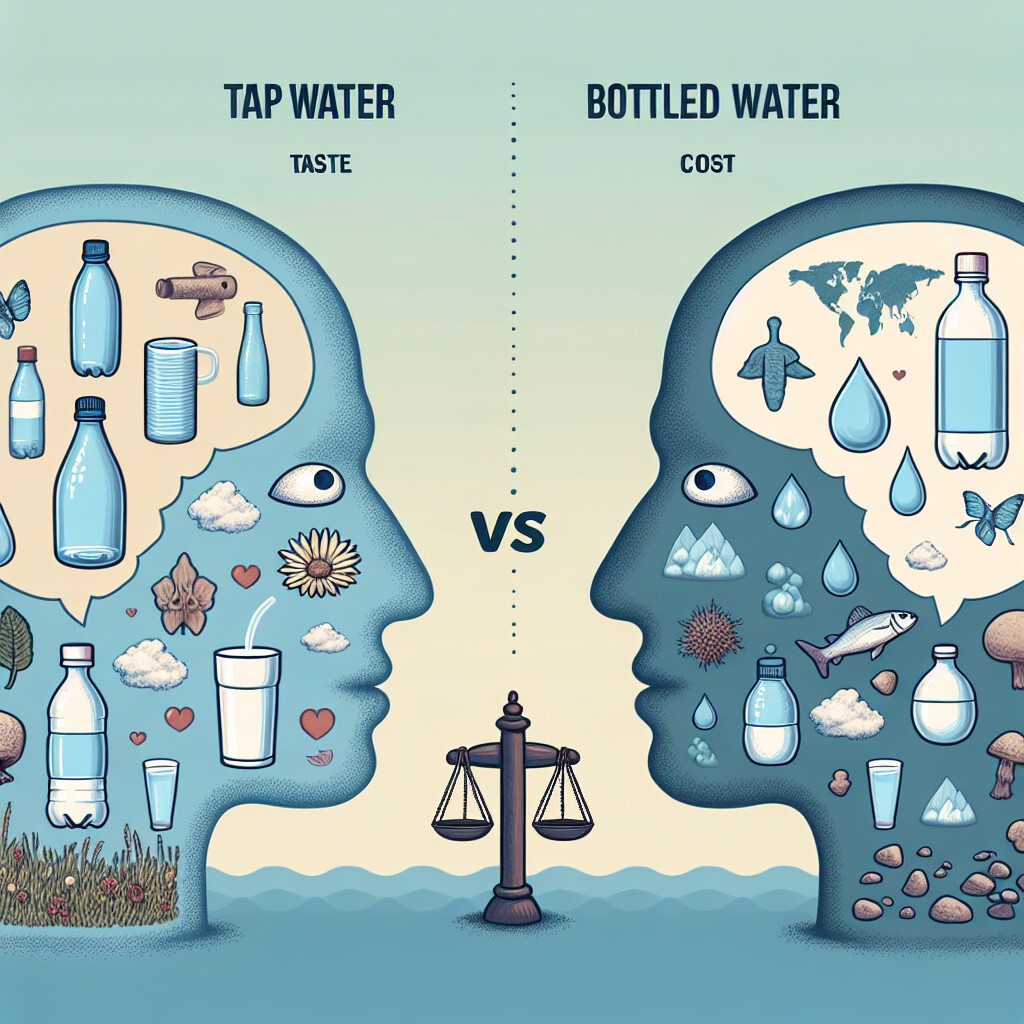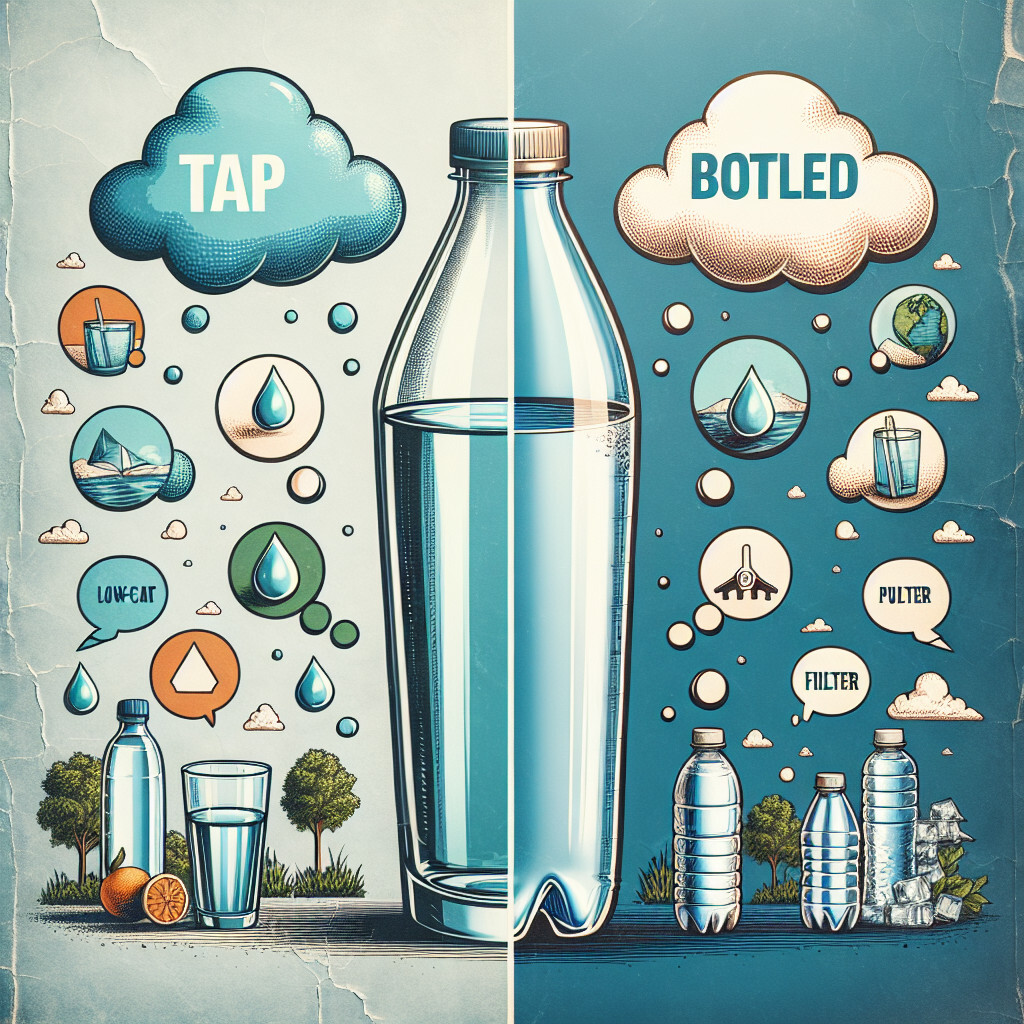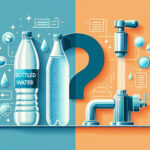-
Table of Contents
“Choose Tap Water: Refreshingly Pure, Economically Sound, and Environmentally Friendly.”
Introduction

Tap water and bottled water are the two main sources of drinking water. The debate over which one is better is ongoing and depends on various factors such as quality, cost, accessibility, and environmental impact. Tap water is generally considered more environmentally friendly and cost-effective, as it eliminates the need for plastic bottles and the energy used to produce and transport them. However, the quality of tap water can vary greatly depending on the location, and in some places, it may not be safe to drink. On the other hand, bottled water is often perceived as being cleaner and safer than tap water, but it is more expensive and contributes to plastic waste. Therefore, the choice between tap water and bottled water often comes down to individual preferences and circumstances.
Comparing the Health Benefits: Tap Water vs Bottled Water
Water is a fundamental necessity for life, and its quality directly impacts our health. The debate between tap water and bottled water has been ongoing for years, with each side presenting compelling arguments. This article aims to compare the health benefits of tap water and bottled water, providing an informative perspective to help you make an informed decision.
Tap water, in many developed countries, is subject to stringent regulations and testing to ensure it is safe for consumption. It is treated with a controlled amount of chlorine to kill bacteria and other microorganisms, making it safe to drink. Additionally, tap water often contains fluoride, a mineral that plays a crucial role in dental health by preventing tooth decay. Therefore, drinking tap water can contribute to maintaining good oral health.
However, the quality of tap water can vary depending on the location. In some areas, tap water may contain trace amounts of harmful substances such as lead, pesticides, and other contaminants. Although these levels are typically within the safety limits set by health authorities, long-term exposure could potentially pose health risks. Therefore, it is advisable to have your tap water tested, especially if you live in an older home or a region known for water contamination issues.
On the other hand, bottled water is often perceived as the safer option due to its packaging and marketing strategies that emphasize purity. It is sourced from springs or artesian wells and undergoes purification processes such as reverse osmosis, distillation, or deionization. This ensures the removal of most contaminants, providing water that is free from harmful substances.
Bottled water does not usually contain fluoride, which can be a disadvantage for dental health. However, some brands have started adding fluoride to their products, so it’s worth checking the label if this is a concern for you. It’s also important to note that the plastic bottles themselves can pose a health risk. Chemicals from the plastic can leach into the water, especially when exposed to heat or stored for a long time. These chemicals, such as bisphenol A (BPA), have been linked to health problems including hormonal disruption and increased risk of certain cancers.
In terms of cost and environmental impact, tap water is the clear winner. It is significantly cheaper than bottled water and does not contribute to plastic waste. However, if the quality of tap water in your area is questionable, bottled water can be a safer choice.
In conclusion, both tap water and bottled water have their pros and cons when it comes to health benefits. Tap water is generally safe, contains fluoride for dental health, and is more environmentally friendly. However, it may contain trace amounts of contaminants depending on the area. Bottled water is often free from contaminants but lacks fluoride and can contain chemicals from the plastic bottle. Therefore, the choice between tap water and bottled water should be based on individual needs, location, and personal preference, always prioritizing safety and health.
Environmental Impact: The Battle Between Tap Water and Bottled Water
The environmental impact of our choices is a topic of increasing importance in today’s world. One such choice that has significant environmental implications is our preference for tap water or bottled water. This decision, seemingly trivial, has far-reaching consequences for our planet.
Bottled water, at first glance, appears to be the more convenient option. It is readily available, easy to carry, and often marketed as a healthier alternative. However, the environmental cost of this convenience is staggering. The production of bottled water involves the extraction of water, the manufacturing of plastic bottles, and the transportation of the final product to the consumer. Each of these stages has a significant environmental footprint.
The extraction process often involves pumping water from natural sources, which can lead to the depletion of local water supplies and negatively impact the surrounding ecosystem. The manufacturing of plastic bottles requires petroleum, a non-renewable resource, and releases harmful emissions into the atmosphere. Furthermore, the transportation of bottled water, often across long distances, results in substantial carbon emissions.
Once consumed, the disposal of plastic bottles presents another environmental challenge. Despite recycling efforts, a significant proportion of plastic bottles end up in landfills or, worse, in our oceans. These bottles take hundreds of years to decompose, during which time they release toxic chemicals into the environment and pose a threat to marine life.
In contrast, tap water has a much lower environmental impact. It is delivered to our homes through an energy-efficient infrastructure, eliminating the need for plastic packaging and transportation. While the treatment and distribution of tap water do have an environmental cost, it is significantly less than that of bottled water.
Moreover, tap water is subject to stringent quality regulations, ensuring it is safe for consumption. In many developed countries, tap water is regularly tested and often contains fewer contaminants than bottled water. Despite this, public perception of tap water quality can be influenced by factors such as taste or clarity, which are not necessarily indicative of water safety.
The use of reusable water bottles can further reduce the environmental impact of our water consumption. These bottles can be filled with tap water and used repeatedly, eliminating the need for single-use plastic bottles. Additionally, many reusable bottles are made from materials like stainless steel or glass, which have a lower environmental impact than plastic.
In conclusion, while bottled water may seem like the more convenient option, it carries a significant environmental cost. Tap water, on the other hand, provides a more sustainable alternative. By choosing tap water over bottled water, we can reduce our environmental footprint and contribute to the preservation of our planet.
However, it is important to note that access to clean, safe tap water is not a privilege enjoyed by everyone. In many parts of the world, bottled water remains the only safe option. Therefore, while we advocate for the use of tap water where possible, we must also strive for equitable access to clean water for all.
The battle between tap water and bottled water is not just about personal preference. It is a choice that has profound implications for our environment. As consumers, we have the power to make a difference. By choosing tap water, we can help protect our planet for future generations.
Cost Analysis: Is Bottled Water Worth the Price Over Tap Water?
The debate between tap water and bottled water has been a topic of discussion for many years. While some people swear by the purity and convenience of bottled water, others argue that tap water is just as safe and significantly less expensive. In this article, we will delve into the cost analysis of both options to determine whether bottled water is worth the price over tap water.
To begin with, it is important to understand the cost implications of both tap water and bottled water. On average, bottled water costs approximately $1.22 per gallon, while tap water costs less than a penny per gallon. This means that bottled water is about 300 times more expensive than tap water. If you consume eight glasses of water a day, switching from bottled to tap water could save you around $1,400 a year.
However, the cost of bottled water is not just financial. There is also an environmental cost to consider. The production of bottled water uses up vast amounts of energy and resources. It takes three times the volume of water to manufacture one bottle of water than it does to fill it, and each year making the plastic water bottles used in the U.S. takes enough oil and energy to fuel a million cars. Moreover, only about 20% of these bottles are recycled, with the rest ending up in landfills or the ocean, contributing to pollution and harming wildlife.
On the other hand, tap water is delivered through an energy-efficient infrastructure and is subject to rigorous testing and regulation. In the United States, for example, the Environmental Protection Agency (EPA) sets strict standards for over 90 contaminants in tap water, and local water utilities must test their water hundreds of times a month for these contaminants.
However, it’s worth noting that the quality of tap water can vary depending on where you live. In some areas, tap water may contain trace amounts of chemicals or minerals that can affect its taste or safety. If you’re concerned about the quality of your tap water, you can have it tested. If necessary, you can also invest in a water filter to remove any potential contaminants. While this does add to the cost of tap water, it’s still significantly cheaper than buying bottled water.
In terms of convenience, bottled water may have the upper hand. It’s easy to grab a bottle of water on the go, and you don’t have to worry about finding a water source when you’re out and about. However, with a little planning, you can easily overcome this issue by filling a reusable water bottle at home and taking it with you.
In conclusion, when considering the cost, both financial and environmental, tap water appears to be a more economical and sustainable choice than bottled water. While there may be situations where bottled water is necessary or more convenient, for everyday hydration, tap water is a viable and cost-effective option. By choosing tap water over bottled water, you can save money and contribute to the preservation of our environment.
Taste Test: The Surprising Truth About Tap Water and Bottled Water
Water is a fundamental necessity for life, and the quality of the water we consume directly impacts our health and wellbeing. The debate between tap water and bottled water has been ongoing for years, with proponents on both sides arguing about taste, quality, and environmental impact. However, the surprising truth is that the choice between tap water and bottled water is not as clear-cut as it may seem.
Firstly, let’s consider the taste. Many people believe that bottled water tastes better than tap water. This belief is often based on the assumption that bottled water comes from pristine sources, while tap water is merely treated municipal water. However, blind taste tests have repeatedly shown that most people cannot distinguish between the two. In fact, some bottled water brands are nothing more than filtered tap water. Therefore, the perceived superiority of bottled water in terms of taste is largely psychological.
In terms of quality, both tap water and bottled water are subject to regulatory standards. In the United States, the Environmental Protection Agency (EPA) regulates tap water, while the Food and Drug Administration (FDA) oversees bottled water. Both agencies set stringent standards for safety and quality. However, it’s worth noting that tap water is tested more frequently than bottled water, and the results are publicly available. This transparency is not always the case with bottled water, where testing results are often proprietary information.
Moreover, tap water in many developed countries is fortified with fluoride, which is beneficial for dental health. Bottled water, on the other hand, often lacks this important mineral. Therefore, from a health perspective, tap water may have an edge over bottled water.
The environmental impact is another crucial factor to consider. Bottled water production and disposal contribute significantly to environmental pollution. The process of bottling water involves extracting water, often from public sources, and then packaging it in plastic bottles. These bottles, if not recycled, end up in landfills or oceans, causing significant environmental harm. On the other hand, tap water has a much lower environmental footprint, as it is delivered through an existing infrastructure without the need for packaging.
However, it’s important to acknowledge that there are situations where bottled water is the better choice. In areas where tap water is contaminated or unsafe to drink, bottled water is a necessary alternative. Similarly, during natural disasters or emergencies when the water supply is compromised, bottled water can be a lifesaver.
In conclusion, the choice between tap water and bottled water is not a simple one. While tap water is generally safe, tastes as good as bottled water, and has a lower environmental impact, there are situations where bottled water is necessary. Therefore, the decision should be based on individual circumstances and preferences. However, it’s essential to remember that the most sustainable and health-conscious choice is often to drink tap water, especially if it’s safe and clean in your area. So, next time you feel thirsty, you might want to reconsider reaching for that bottle of water and instead, fill up a glass from the tap.
Q&A
1. Question: What are the benefits of drinking tap water?
Answer: Tap water is typically treated by municipalities to meet strict health standards and is regularly tested for quality. It is also more environmentally friendly as it reduces plastic waste from bottled water.
2. Question: Why might someone prefer bottled water over tap water?
Answer: Some people might prefer bottled water due to concerns about the quality of their local tap water, or because they prefer the taste. Bottled water is also convenient for on-the-go hydration.
3. Question: Is there a significant difference in the quality of bottled water and tap water?
Answer: The quality of both bottled water and tap water can vary depending on the source. However, both are generally safe to drink. In many developed countries, tap water is subject to more stringent regulation and testing than bottled water.
4. Question: What are the environmental impacts of choosing bottled water over tap water?
Answer: Choosing bottled water over tap water can have significant environmental impacts. The production and disposal of plastic bottles contributes to pollution and waste. Additionally, transporting bottled water uses more energy than delivering tap water through the existing infrastructure.
Conclusion
In terms of environmental impact and cost, tap water is better as it reduces plastic waste and is much cheaper. However, the quality can vary depending on the location. Bottled water is often more convenient and can be safer in areas where tap water is not potable. Therefore, the better option depends on the individual’s specific circumstances and priorities.






